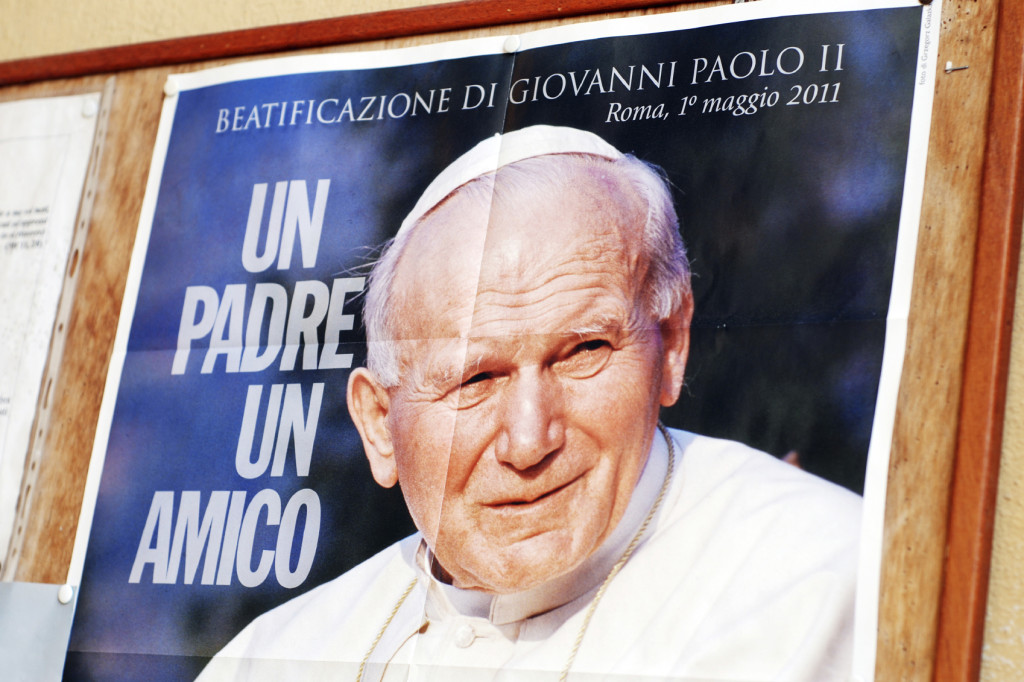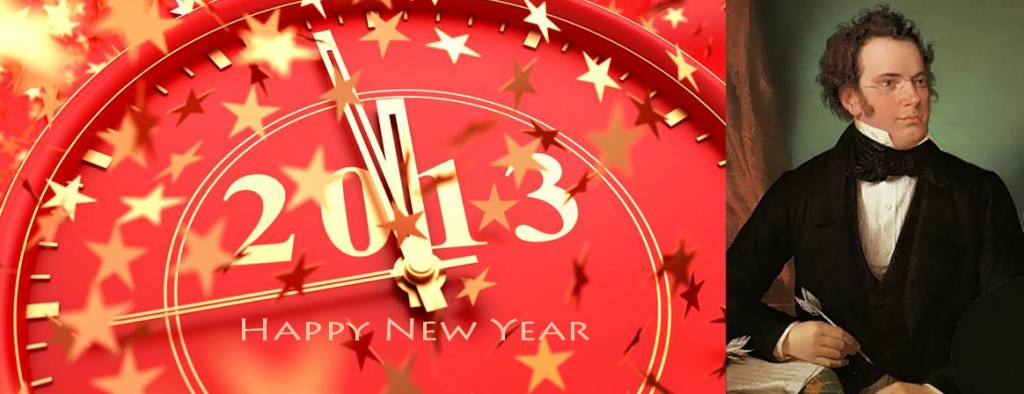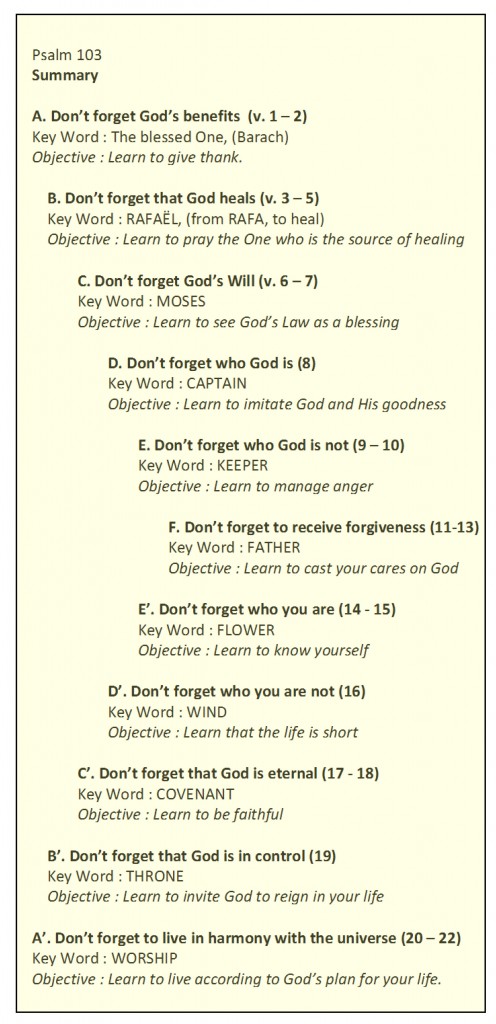“We decl are and define as saints the blessed John XXII and John Paul II.” The Pope Francis, on behalf of the Catholic Church, canonized the two predecessors during an important ceremony with more than one million people in attendance.
are and define as saints the blessed John XXII and John Paul II.” The Pope Francis, on behalf of the Catholic Church, canonized the two predecessors during an important ceremony with more than one million people in attendance.
The current Pope presented the John XXIII in the following terms: ‘I like to think of him as the pope of openness to the Holy Spirit.” Probably, this is the allusion to the courage of John XXIII to call for the council Vatican II, while nobody expected it, and to stay open to the guidance of the Holy Spirit during his short ministry. The words of Francis regarding the pope John-Paul II were interesting: “In his own service to the People of God, Saint John Paul II was the pope of the family. He himself once said that he wanted to be remembered as the pope of the family.”
From the beginning of the Christian church two thousand years ago we can mention 265 popes. 80 of them were canonized and 11 came to the level of beatification.
We fully agree that the guidance of the Holy Spirit is essential in Christian life. Also, more and more, the family is under attack, and it is important to use all means to defend it and to promote the quality of life in this basic, essential unit of the social life. If families are strong, the society will be strong. Destroy the families, and you will destroy the society.
However, thinking biblically, the question of promoting people to become saints is totally different. Only God is qualified to judge our level of spiritual growth. And the apostle Paul says: “But of Him you are in Christ Jesus, who became for us wisdom from God – and righteousness and sanctification and redemption.” (1 Corinthians 1: 30). Thus, we are considered as saints, because of Jesus who became our sanctification.
So, don’t worry. If you are really interested to become a saint, in the right, biblical way, the procedure is much easier to follow than a long procedure of becoming a venerable, blessed, and finally saint. You need to accept Jesus as your personal Saviour, to surrender your heart to Him, and to follow Him through the power of the Holy Spirit.
In addition, I prefer the idea of Nelson Mandela. He said, “I’m not a saint, unless you think of a saint as a sinner who keeps on trying.” And we need to include to his concept another essential thought. Not only to try, but to act, not by our power, but through the power of Jesus Christ. “I can do all things through Christ who strengthens me.” (Philippians 4: 13).
This is also the meaning of our title: ‘Sancto Subito in Christo’: to become a saint immediately in Christ.
Author Archive
SANCTO SUBITO IN CHRISTO
Habemus Iesum Christum
 Thousands and thousands of faithful people came to the St. Peter’s Square on March 13, 2013, waiting for the election of the new pope. It was only the second day of the conclave. But they were right. The white smoke confirmed that the cardinals chose someone among them to take the charge of the Bishop of Rome. The jubilant crowd has received with delight the famous words: ‘Habemus Papam’ (We have the Pope). Their exultation was really profound. Without knowing the new pontiff, they’ve just continued to appreciate this important moment and to express their gladness for the new leader of the Catholic Church.
Thousands and thousands of faithful people came to the St. Peter’s Square on March 13, 2013, waiting for the election of the new pope. It was only the second day of the conclave. But they were right. The white smoke confirmed that the cardinals chose someone among them to take the charge of the Bishop of Rome. The jubilant crowd has received with delight the famous words: ‘Habemus Papam’ (We have the Pope). Their exultation was really profound. Without knowing the new pontiff, they’ve just continued to appreciate this important moment and to express their gladness for the new leader of the Catholic Church.
Thinking of their pure and sincere joy, we cannot avoid thinking about the attitude of every child of God. In fact, we have so many reasons to be happy, to be delighted. Every day we can experience the wonderful reality of having someone who is our guide and our protector, and who doesn’t need to be elected. He is on our side since the beginning of the world. To use the same expression as it was pronounced on the St. Peter’s Square, and using the Vulgate version of the Bible, we can affirm: “Habemus Iesum Christum”:
“My dear children, I am writing this to you so that you will not sin. But if anyone does sin, we have an advocate who pleads our case before the Father, Jesus Christ. The one who is truly righteous.” (1 John 2: 1.) In Latin, ‘Habemus advocatum Iesum Christum Iustum’.
N. T. Wright, a very known New Testament scholar, declared, “When we learn to read the story of Jesus and see it as the story of the love of God, doing for us what we could not do for ourselves – that insight produces, again and again, a sense of astonished gratitude which is very near the heart of authentic Christian experience.”
What a joy to have Jesus Christ. What a blessed assurance to have Him as our Lord and Savior. “Looking unto Jesus we obtain brighter and more distinct views of God, and by beholding we become changed. Goodness, love for our fellow men, becomes our natural instinct. We develop a character which is the counterpart of the divine character. Growing into His likeness, we enlarge our capacity for knowing God. More and more we enter into fellowship with the heavenly world, and we have continually increasing power to receive the riches of the knowledge and wisdom of eternity. (Ellen G. White, Christ Object Lessons, p. 355.)
Let’s allow God to fill our hearts with the joy of Jesus-Christ. And may this joy be perfectly seen in our life, until His coming. Be glad. HABEMUS IESUM CHRISTUM.
Dormi Sogna (Mille Cherubini in Coro)
“I came into the world for nothing else, only composing,” the famous Franz Schubert from Vienna, Austria, wrote in 1820. “My creations exist by the knowledge of music and of suffering.” A young artist, who died at 31, experienced the difficulties of life, the severe and intense sickness, as well as the emptiness of existence of those who feel rejected and forgotten. And this is how he came to find refuge in music, to express his pain through his art.
One of his songs became very popular, called ‘Wiegenlied’, D 498. It was known as a lullaby, berceuse, but became the part of the Christmas repertoire since an adaptation in Italian, ‘Mille cherubini in coro’. Andrea Bocelli considers it as his preferred Christmas music. The lyrics are really beautiful. These words remind us the quietness of Bethlehem and the mystery of incarnation. It is easy, while listening to the music, to imagine the ‘silent night’ where God gave to us the most precious gift, Jesus-Christ.
But there is another message we want to underline. Franz Schubert had a very short life. However he was able to identify his goal and his mission. He came to compose. People didn’t understand always his words. Publishing houses refused to print his music. Financial support was almost inexistent. His solitude was obvious. Nevertheless, his impact was tremendous. He understood the reason of his existence and continued to compose where nobody believed in Him. At the end of his life the influence of his music was real. Franz List said that “Schubert was the most poetic musician that ever lived.”
In the year to come, 2013, we wish you the abundance of God’s blessings. May His peace fill your heart in all circumstances. And don’t forget Schubert. Enjoy your life and find why you are on this planet. Then do whatever is possible to fulfill your mission. As Steve Maraboli stated, “Your greatest self has been waiting your whole life; don’t make it wait any longer.” Be the most poetic performer of your own mission.
Lyrics: Dormi, dormi, sogna, piccolo amor mio. Dormi, sogna, posa il capo sul mio cor. Mille cherubini in coro ti sorridono dal ciel. Una dolce canzone t’accarezza il crin. Una man ti guida lieve fra le nuvole d’or, sognando e vegliando su te, mio tesor, proteggendo il tuo cammin. Su te, mio tesor, proteggendo il tuo cammin.
Honesty
“I exhort therefore, that, first of all, supplications, prayers, intercessions, and giving of thanks, be made for all men; For kings, and for all that are in authority; that we may lead a quiet and peaceable life in all godliness and honesty.” 1 Timothy 2: 1. 2.
Our society very often considers success as accumulation of material things. This is not the biblical point of view. God prefers that we spend time taking care of our heart. Our character, our thoughts of love, words of love, and actions of love are the only things that we will bring with us to heaven. All other accomplishments are insignificant. And this is why we need to promote, with the apostle Paul, prayer, thanksgiving, peace, godliness and honesty.
Peter Scotese said, “Integrity is not a 90 percent thing, not a 95 percent thing; either you have it or you don’t.”
I invite you to think about the foundational values of our life. Let’s be 100% honest, 100% prayer oriented, 100% thankful. Let’s be 100% on God’s side.
Divine Human Rights
 On Monday, September 24, 2012, a high representative of the Catholic Church, Msgr. Dominique Mamberti, Secretary for relations with States, attended the 67th Session of the General Assembly of the United Nations, and submitted a very important document regarding a “particularly urgent task for a just, equitable and effective world governance. ” (1)
On Monday, September 24, 2012, a high representative of the Catholic Church, Msgr. Dominique Mamberti, Secretary for relations with States, attended the 67th Session of the General Assembly of the United Nations, and submitted a very important document regarding a “particularly urgent task for a just, equitable and effective world governance. ” (1)
In general, media draw attention to the contributions of world-renowned political leaders. Thus, Mssrs. Obama, Ahmadinejad, Netanyahu, and Holande (new French president), attracted the attention of television and newspapers. However, it is also essential to analyze major contributions to the discussion of how to lead the world in this time of crisis. Those who have religious convictions and are grounded in God’s Word have sufficient reason to be very attentive.
The text presented by Msgr. Mamberti is well organized, with an outstanding structure, and written with talent and clarity. In addition, it is almost predictable that a religious spokesperson carefully avoids religious vocabulary while speaking to a diplomatic audience. And we can understand his reasoning when he affirms that the international society is witnessing a “juridical disorder”, a total lack of solid foundation. It is very difficult, from the perspective of those who govern society at the beginning of the 21st century, to decide what is right and what is wrong. (2) However, his suggestion to take human rights as the ultimate authority is significant and I will focus on the basic elements of this declaration.
Msgr. Mamberti states: “The Preamble and the first article of the United Nations Charter, together with the Universal Declaration of Human Rights, are the result of a lengthy juridical and political process, which began with the encounter between the theoretical and philosophical reasoning of Greek culture and the juridical and practical reasoning of the Romans, to which were added other elements, such as Judaeo-Christian wisdom, the laws of other European peoples, canon law and its developments, the mediaeval and Renaissance work of Jewish, Arab and Christian philosophers and lastly contribution of the thinking of the Enlightenment and of the political developments due to the revolutions of the 18th century.” (3)
According to the above passage, the United Nations’ Charter and the Universal Declaration of Human Rights are anchored on the foundations of 1. Greek philosophy; and 2. Legislative Roman heritage; furthermore, there is mention of additional elements: 3. Judaeo-Christian wisdom; 4. Juridical contribution of European nations; 5. Church tradition (canon law and its developments); 6. Mediaeval and Renaissance philosophy; and 7. Enlightenment. The conclusion of Msgr. Mamberti is also instructive: “It is only in the light of this complex, rich and intricate edifice, which is simultaneously historical, juridical and philosophical, that the inviolable and inalienable rights of the human person can and must be appreciated as the essence of the law, and to which the rules must refer.”
This declaration calls for some comments:
1. Human rights can only be defined through a reference to God himself. Further, human beings cannot define the rights of other human beings if they fail to recognize the creation of humanity in God’s image. When we eliminate God, we provide human rights and dignity only partially or temporarily, or from the wrong perspective. The absence of God’s vision for our planet produces wars in the name of human rights and the promotion of entitlements that do not contribute to man’s dignity.
2. Man was not created to only enjoy dignity and to claim rights. God the Creator imagined him as a being of love. And through His plan for the happiness of created beings, He made things in such a way that the dignity of man is permanently flowing through his love, through his service, and through his connection with others. Therefore, it is important not only to promote human rights, but to promote that which will develop the dignity of man. It is his service that helps him to live a life of fulfillment. As Ellen White stated, “[True education] is the harmonious development of the physical, the mental, and the spiritual powers. It prepares the student for the joy of service in this world and for the higher joy of wider service in the world to come.” (4) Through his service, man becomes who he really is: a being of love, an incredible blessing for others.
3. Even though we respect Greek philosophy and Roman legislation, even though we praise the Lord for the achievements of so many exceptional individuals throughout human history, we have only one reference: “Thus says the Lord”. We prefer to be grounded in “It Is Written” than to navigate through the labyrinth of human wisdom and confusion. “Let not the wise man boast in his wisdom, let not the mighty man boast in his might, let not the rich man boast in his riches, but let him who boasts boast in this, that he understands and knows me, that I am the LORD”. (5)
I invite you to always do your best for your country. A true Christian is continuously an outstanding citizen. I encourage you to pray for leaders where you live and for those who take care of world governance. Do everything that is possible to contribute to a society of prosperity, respect, and peace. But never forget your ultimate term of reference: “Whether it is right in the sight of God to listen to man more than to God.” (6) This is the only way to respect the rights of all human beings in all their dignity. And do it because you consider them not only as protected by the Declaration of Human Rights, but uplifted by God himself: “Behold what manner of love the Father has bestowed on us, that we should be called children of God!” Do not be guided exclusively by human rights. Promote divine human rights.
(1) High-level Meeting of the 67th session of the General Assembly on the Rule of Law and the National and International Levels, Statement by H.E. Msgr. Dominique Mamberti, Secretary for relations with states and head of the Holy See delegation at the 67th ordinary session of the General Assembly of the United Nations, Monday 24 September 2012.
(2) “Where there is a lack of objective criteria as a basis and guide for legislative activity, the affirmation of the rule of law is reduced to a sterile tautology, to a mere “rule of rules”, Mamberti, par. 5.
(3) Mamberti, par. 8.
(4) Education, p. 13.
(5) Jeremiah 9: 23 – 24.
(6) Acts 4: 19.
The very best
 Winston Churchill, best known as Prime Minister of the United Kingdom during the WWII, was considered not only as a fine politician, but also as “the greatest human being ever to occupy 10 Downing Street” (Roy Jenkins). His capacity to take hard decisions, to make great speeches, to communicate with simple citizens of his kingdom, or to write great books (Nobel Prize in 1953, Litterature) contributed to his image of a very polyvalent man. It is hard to find a stateman as often quoted as himself. It’s why it is interesting to know his opinion about the principles guiding his everyday life. He affirmed:
Winston Churchill, best known as Prime Minister of the United Kingdom during the WWII, was considered not only as a fine politician, but also as “the greatest human being ever to occupy 10 Downing Street” (Roy Jenkins). His capacity to take hard decisions, to make great speeches, to communicate with simple citizens of his kingdom, or to write great books (Nobel Prize in 1953, Litterature) contributed to his image of a very polyvalent man. It is hard to find a stateman as often quoted as himself. It’s why it is interesting to know his opinion about the principles guiding his everyday life. He affirmed:
We agree with Sir Churchill. It is essential to focus our strenghts to the fulfillment of high ideals. Only the weak characters will be satisfied with the mediocrity. Only those who have a poor self esteem will consume something destroying their body. We are worthy to invest in our well being.
It doesn’t mean that we will accept a high level of expenses. There is no doubt that we are all limited, financially, socially, and especially with our time. It is almost impossible to always wear the best clothes, to eat the best food, to assist to the best concerts, to take vacations on the best places in the world and so on. In all honesty, it was not Churchill’s main idea. For him, the most important question is the state of mind. He rejects weak goals. His point of view implies that man simplifies his future when he looks to what is the best.
Even the persons without plenty of money can have the same concept in their life. For exemple, it is not necessary to have the best cell phone in order to have the best communications with our beloved. Also, a simple walk could have more impact on a relationship with someone then a very expensive car for the long trips.
Let’s mention the necessity of the education of our aspirations. It is not always wise to listen the desire of our senses. Very often what is attractive is not valuable. As Robert Redford said, “Health food may be good for the conscience but Oreos taste a hell of a lot better”. It is evident that it takes time, patience, hard willing and a true enthousiasm to see the best becoming our real ideal of life.
However, the most important fact is the reality of God’s love for us. He has always the best plans for our future. The prophet Jeremiah reminds us: “I know the thoughts that I think towards you, says the Lord, thoughts of peace and not of evil, to give you a future and a hope.”
God’s goodness leads our life in the direction of peace and serenity because we understand in our hearts that our future is filled with the precious gifts from the heavenly tresors.
I invite you to follow the suggestion of Sir Winston Churchill. Be satisfied with the very best. Accept God’s projects for your future. May it be the blessed perspective of our existence. We are not created for pour moins de cela.
The most important need
 Jesus-Christ, the greatest gift that humanity has ever received, made this surprising statement: “It is to your advantage that I go away…” (John 16:7, NKJV) For centuries, crowds awaited the promised Messiah. Each mother dreamed of holding in her arms the child that would put a stop to injustice and suffering. Barely had the name of Immanuel, that is, “God with us”, passed the lips that Jesus was already announcing his departure. His words, “Let not your heart be troubled, I go away”, resonated in the hearts of the disciples.
Jesus-Christ, the greatest gift that humanity has ever received, made this surprising statement: “It is to your advantage that I go away…” (John 16:7, NKJV) For centuries, crowds awaited the promised Messiah. Each mother dreamed of holding in her arms the child that would put a stop to injustice and suffering. Barely had the name of Immanuel, that is, “God with us”, passed the lips that Jesus was already announcing his departure. His words, “Let not your heart be troubled, I go away”, resonated in the hearts of the disciples.
For many, questions are numerous: Is it possible that we must after the Ascension be satisfied with Jesus’ absence? Would the lives of God’s children be characterized by simply waiting, just as they were for years before the miracle in Bethlehem? How is it possible to consider the two-thousand-year delay without believing that God is distancing Himself from the affairs of this planet?
But the reality is entirely different. Jesus’ departure changed everything. We have not come back to the same type of waiting period as before the coming of the Messiah. This time, all the advantages are on our side, and not only because of the cross and of the resurrection. The main advantage resides in the qualities of our Counsellor.
If we speak of a departure, we must not forget an arrival: the arrival of the dove, the divine breath, the fire that warms the hearts wounded by life’s challenges. Yes, the Spirit of God makes all the difference. His presence appeases and invigorates. His voice leads us into all truth. His action strengthens us, sealing us unto eternal life.
Because of Him, we wait without despairing. By His strength, we triumph without becoming weary. Thanks to His salvific action, we become children of God without ever feeling condemned. On His road, we move forward without slowing down.
In fact, nothing can be accomplished, in one’s personal life, nor in the life of the church without the impulse originating from the Holy Spirit. There is no progress, no piety, no worship, and of course no evangelism possible without His taking more space in the heart. As Paul Josef Cordes said, “It is the Spirit of God that arouses the holiness of man. All we have to do is to prepare in our lives a space for this Spirit.”
I sincerely pray that God will grant us His grace so that we may be animated by His Spirit, where we will have as a priority the preparation of a space for Him. “Heavenly Father, we ask You to please give us Your Holy Spirit and to give it to us always anew, that He may wake us up, enlighten us, encourage us and help us to risk big and small steps, for the consolation by which we seek to comfort ourselves, to lead us to hope in you. Turn us away from looking at ourselves in order to look to you; keep us from turning away from your sight. Do not allow us to seek for solutions without you. Reveal to us your magnificence and show us how much it is admirable to confide in you and to obey You. (Karl Barth, To come in God’s presence)
The good news is that God is ready to grant us this marvellous gift. Let us ask and we shall receive. I have no doubt that He will grant us what we desire of Him. “As surely as the sun rises, he will appear; he will come to us like the winter rains, like the spring rains that water the earth.” (Hosea 6:3, NIV )
True religion and its simplicity
 When one passes by the Barrington Street in Halifax, he is sure to notice the St. Mary Basilica. It is a magnificent edifice, reminiscent of the fervor of its founders in 1820. It’s fame in Nova Scotia is such that Pope John Paul II visited it in the sixth year of its pontificate. But above all, what strikes the visitor is the inscription written above its three main doors: “One Lord, One Faith, One Baptism”.
When one passes by the Barrington Street in Halifax, he is sure to notice the St. Mary Basilica. It is a magnificent edifice, reminiscent of the fervor of its founders in 1820. It’s fame in Nova Scotia is such that Pope John Paul II visited it in the sixth year of its pontificate. But above all, what strikes the visitor is the inscription written above its three main doors: “One Lord, One Faith, One Baptism”.
It is a quote from the epistle to the Ephesians, where the apostle Paul sends a vibrant message. His remarks bear the strength of simplicity. They constitute a program that is easy to remember, and emphasize what matters most: the unity of the Church of God. And this idea challenges us today.
In fact, the Christian message is increasingly complex, and creates some kind of confusion among the hundreds of views found in Christendom. According to many contemporary religious pundits, to talk seriously about religion, one has to study theology for at least four years. Yet, the final result would not be guaranteed. For instance, the interpretation of fundamental Bible texts will depend on the school of thoughts, or the affiliation of the training institution.
Nonetheless, God has always wanted to simplify His relationship with human beings. They are the ones who created all kinds of useless burdens. They are the ones who talked about the financial requirements, the administrative votes, the sacraments, the encyclicals, the deadly sins, and so on. Jesus saw things in a different way. His thought remains unchanged. Woe to you! For laying aside the commandment of God, you hold the tradition of men (Mark 7:8).
For too long Christians did not realize that by multiplying the rules, they weakened the revolutionary message of Jesus.
I am deeply convinced that one of the aspects of our identity that Isaiah talks about means exactly that. “The Repairer of the Breach” is certainly the one who proclaims the gospel in its simplicity and its incredible strength to transform humanity by the power of God’s grace.”
Therefore, I accept the idea of, “one Lord,” but I reject all other intercessors ‘under heaven’. I accept ‘one faith’, but I refuse to add a line voted by human assemblies. I accept ‘one baptism’, as a sign of entry into the kingdom of God and the church, but I cannot imagine that one of my actions could qualify me for eternity. I understand that by abiding in Jesus, I become a child of God. And it is this concept of unity that I am looking for; not the one that comes from human negotiations, but the one that springs from our attachment to Jesus.
This is how I would like to call everyone to live in unity by the strength that God gives us through the action of His Son. Let’s turn to Him.
He has the solutions to all our challenges. Let’s seek His balm. He is the One who will heal us. “The cause of division and discord in families and in the church is separation from Christ. To come near to Christ is to come near to one another. The secret of true unity in the church and in the family is not diplomacy, not management, not a superhuman effort to overcome difficulties—though there will be much of this to do—but union with Christ. (Mind, Character, and Personality, p. 501).
The time in which we live is more than serious. The foundations of the Western economy are shaking. Global warming threatens our survival. Extremism is gaining ground and secularism alienates people. The only hope is God. Let us keep life simple by following His teachings.
May our spiritual life be strong because it is anchored in Jesus-Christ. May we live in unity with God and human beings. May every day of our life give us an opportunity to invite everyone to turn their eyes toward the One who is the author and finisher of our faith. We have this privilege. May we be worthy of our vocation.
The Abundant Life

Reflections on Psalm 103
Modern man tends to forget things. He is more easily distracted than previous generations. Thanks to the latest technology, he can work on many projects at once. In this relentless pursuit of performance, and achievements, he forgets to live. His soul is unable to turn to core values and to find meaning in life’s simple pleasures. Psalm 103 is definitely a poem that can help him to reflect on the quality of life, and the « abundant life » as Jesus saw it.
The psalm is made of 11 stanzas, with a chiasmus commonly found in Bible literature. In this structure, the most important message is at the centre of the text and all the other elements are presented in parallel phrases, as if to emphasize the central message. The key point of Psalm 103 is confirmed by its construction and is vital for human beings: God wants fulfilment and happiness for His children. There are 11 principles that we must not forget if we want to live a life that is both satisfying and blessed.
1. Don’t forget God’s blessings
The Torah reminded the Israelites the dangers of forgetfulness: “When you have eaten and are full, then beware, lest you forget the Lord who brought you out of the land of Egypt, from the house of bondage” (Deuteronomy 6:12). We must admit that the beautiful country in which we live is much closer to prosperity than what we could imagine for God’s people in the Promised Land: They did not have washing machines, a central heater, tap water, and so on. Yet they forgot to thank God for all His blessings. The same thing could happen to us if we fall prey to the prevailing discontentedness depicted in the text of Pierre Dac, the French poet:
Never happy
People never satisfied with their lot
Are those who are always complaining
That things are bad
When everything is not well;
Who, when everything is well,
Complain that everything is not very well;
Who, when everything is very well,
Complain that everything is not excellent;
Who, when everything is excellent,
Complain that everything is not perfect;
Who, when everything is perfect,
Complain that perfection doesn’t belong to this world;
Who, when they have everything they want,
Complain that they don’t have everything they dream of;
And who, when they have everything they want,
And everything they dream of,
Fall into a depression,
For they have nothing to desire,
And nothing to long for.
2) Don’t Forget that God Heals You
We are grateful for the remarkable work of health professionals, but we must keep in mind a fundamental truth: God is the author of life and He is the one who heals us. Moreover, His action is holistic. He gives us physical health, forgiveness and crowns us with goodness. Therefore, it is important to maintain a close relationship with Him through prayer and meditation.
3) Don’t forget God’s Will
Sometimes God’s ways seem restricting. Many people think that they are contrary to their freedom. However, David reminds us that God’s revelation to Moses contributes to man’s happiness in a remarkable way. Let’s remember God’s words to Isaiah: “Oh, that you had heeded my commandments! Then your peace would have been like a river, and your righteousness like the waves of the sea” (Isaiah 48:18).
4) Don’t Forget Who God Is
The phrase ‘abounding in mercy’ could also be translated as ‘chief, Lord of mercy. The phrase RAV in Hebrew is a term describing someone who is full of respect (the word ‘Rabi’ derives from it). It also has a military connotation representing a commander, or a captain. We must never forget that God is the epitome of goodness. When a problem arises, we are prone to accuse Him. Nonetheless, Christians know that we have a God like none other. He is the source of benevolence. No one else is as merciful as He is.
5) Don’t Forget Who God is Not
Here we see that God does not keep His anger forever. This is a good example for men and women who succumb too often to their irritation. The Hebrew word for anger is ‘aph’ which also means ‘the nose’ and refers to the red nose of those who are exasperated and who are breathing with agitation. But God is not like that and His children would do well to imitate Him. When we think about the abundant life, and wellness, we must bear in mind that we need inner peace to grow a strong body.
6) Don’t Forget to Receive Forgiveness
Most people bear their burdens for too long. They cannot get rid of their guilt feelings, clumsiness, and imperfection. So they focus on their mistakes and live in auto-destruction. God offers a much better alternative: by the action of His grace, He wants to keep our past far from us. He is ready to make it inaccessible, and far from our present experience. He wants us to keep our eyes on the bright future that He is preparing for us. That is why He removes our transgressions from us “as the heavens are high above the earth, and as far as the east is from the west”.
7) Don’t Forget Who You Are
On the temple built in Delphes, the Greeks wrote the following: “Know yourself.” They considered this as the ultimate knowledge or religious experience. The Bible teaches something else. It says that the most important thing is to know God, because to know Him is life eternal (John 17:3). And then He will help us to know ourselves because He is our Creator and He sees us, not as we are, but as we may become in Him (1 John 3:1-3). That is why David invites us not to forget the way that God looks at us and that shows His patience toward us.
8 ) Don’t Forget Who You Are Not
The Turks used to say: “Man is harder than iron, stronger than stone and more fragile than a rose.” But we tend to forget that. We think that everything is possible, and that the future can be up to our dreams. The Bible writers remind us to take it easy by saying that we are “like the wind”, or as Moses said: ‘like a sigh’ (Psalm 90:9). For those who accept it, this truth is of the utmost importance. By accepting our frailty we will become more ‘realistic’, less solitary and we will learn to be interdependent. Above all, we will value the life that God has given us. Yes, life is short, and so it is in the valley of the shadow of death. The good news of salvation will soon be realized and we will obtain the indestructible life that God has promised.
9) Don’t Forget that which is Eternal
Cicero said: “God’s law is ‘right reason’. When perfectly understood, it is called ‘wisdom’. When applied by government in regulating human relations it is called ‘justice.” If we look at David’s perspective, we will agree thatCicerois right. David knew that God is always faithful, and that He will abide with human beings, no matter what. May we take advantage of this affirmation to taste His faithfulness, the beauty of His covenant and allow Him to live within our hearts.
10) Don’t Forget that God is in Control.
God is the Master of the universe. Angels, cherubs, seraphs, and a host of beings bow before Him. Unfortunately, the human beings on spaceship Earth strive to dominate and control things. So many couples divorce simply because one person wants to be right! How many bloody battles are due to the fact that we do not want to submit to God’s reign. Our psalm reaffirms God’s sovereignty. It is best for us to invite Him to reign in our hearts.
11) Don’t Forget to Live in Harmony with the Universe
God created us to find fulfillment in worship. It is in the total and permanent connection to the source of life that we must live. It is by uplifting our Creator that we find the right perspective. It is only when we bow before God that we find our true selves. Joseph L. Garlington said: “To worship is to act as inferior before a superior. When I worship God, I am saying by my actions, ‘God, you are better than I am. You are bigger than I am. You are more than I am.’” Unless we understand this, we are nothing.
What better way to conclude this reflection on the abundant life by quoting C.S. Lewis who reminds us how to build a life worth living: ‘We only learn to behave ourselves as humans in the presence of God.” May this fundamental text of King David become a permanent inspiration for us. Yes, life of quality is possible. Let’s not forget to live fully like those who are blessed, those who know God and His love, but also know their own weaknesses, those who, above all, live by God’s grace, in harmony with the universe, and surrender their lives to Him. Obviously, such a life of happiness, joy and worship is exciting.


